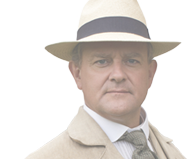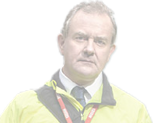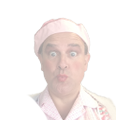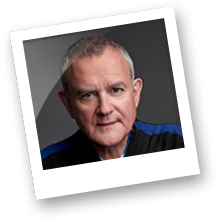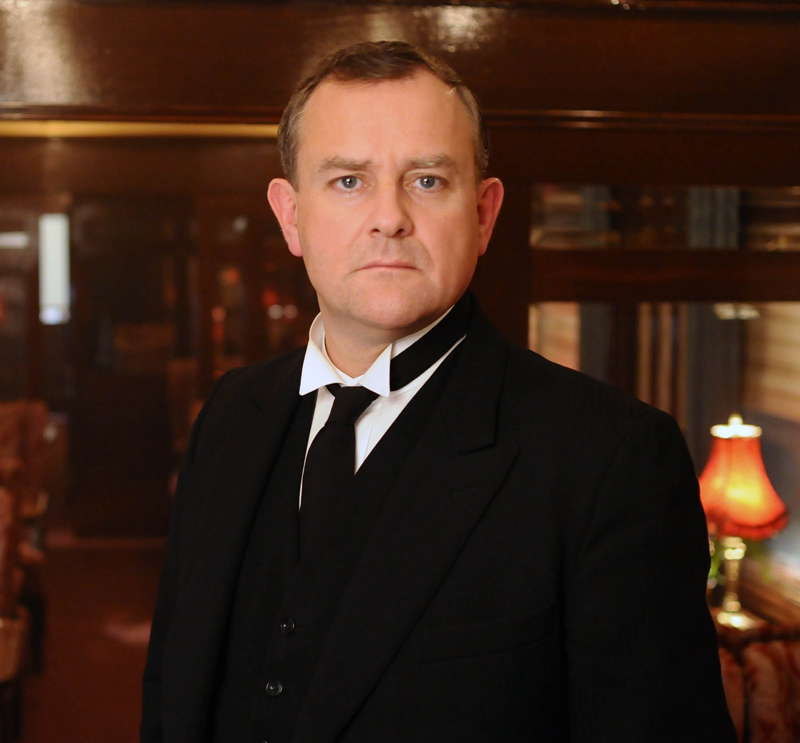Interview by Emine Saner for The Guardian
Hugh Bonneville stars in this Christmas’s Poirot. How did he become the poster-boy of period drama?
Down at the ITV offices, Hugh Bonneville thinks he is giving a press conference about his role as a butler in the new Poirot, Murder On the Orient Express, to be shown on Christmas Day. Yet all anyone wants to talk about is Downton Abbey. In his role as Robert Crawley, the Earl of Grantham, who presides over a house and family on the brink of ruin, Bonneville was a pivotal part of the Edwardian costume drama that pulled in 11.6m viewers and became the TV sensation of the year. In the next room, David Suchet (Poirot) is being interviewed and can be heard through the wall murmuring about Downton – and he wasn’t even in it.
“I’ve had people come up to me in the past and say they enjoyed whatever show I’ve been in,” says Bonneville. “But this time I’ve had people grabbing me by the hand saying, ‘What am I going to do now I haven’t got Downton for another year?'” He looks like a man satisfied, but slightly shellshocked, by its reception. “It’s a once in a decade, or once in a career-type wave of acceptance of a project.”
Before the second series of Downton Abbey next year (writer Julian Fellowes is said to be typing away as we speak), Bonneville will appear in two Agatha Christie adaptations: as an inspector in the Marple episode The Mirror Crack’d from Side to Side, and in the Christmas Day Murder On the Orient Express. Maybe it’s because he is as solid and plummy as a warm Christmas pudding, but Bonneville always seems to find his natural home in a period drama, though his career has been diverse. He played Philip Larkin in the TV drama Love Again, a detective in the crime drama Five Days, and a charmingly scruffy academic in Bonekickers. He points to his role in the forthcoming BBC comedy Twenty Twelve, as the head of an Olympic delivery committee, as evidence he isn’t all about starched shirts and nice manners.
The son of a surgeon and a nurse, Bonneville says acting was “something I always did. I pretended in my teens that I would be a lawyer, but I think I always knew.” After studying theology, he went to work first for the National Theatre and then at the Royal Shakespeare Company, a place where he says “I was probably the happiest I’ve been as an actor”. Theatre was his first love, but his RSC contract wasn’t renewed. “I was devastated and thought I would never work again,” he says. Then he started getting small television and film roles that got bigger and bigger.
Now Downton Abbey has made his name. So why was it such a hit? “The writing,” says Bonneville. “I think the casting was immaculate, and everything came together on the set. Every department took such incredible care. I remember one of the props guys adjusting a fern on a centrepiece on the dinner table between takes. He wasn’t happy with it. I remember watching him, even on the 10th take, still worrying away at it. I love that attention to detail. They spent thousands shooting the hunt scenes at the right time of year, to make sure there wouldn’t be leaves on the trees because people would have written in to complain if there were.” Ah yes, the complaints: people have carped about everything from the too-modern language to the mention of a historically inaccurate hamster. “It’s great,” says Bonneville. “I’d rather that than people not giving a monkey’s.”
Why have the themes of this Edwardian drama so resonated? Mark Lawson recently noted that toff TV thrives under Tory governments in recession (he cites the success of Brideshead Revisited under Thatcher; Pride and Prejudice under Major).
Perhaps it’s the reassurance, says Bonneville, who lives in Sussex with his wife and young son. “You feel confident with these characters, you want to be in a room with them. That’s not to say you necessarily like them, but you are interested in the way they interact with each other. There is also something about glimpsing an era that you know is about to change but until then was an era of certainty. We live in fragile, uncertain, neurotic times and Downton is a world of self-confidence as a nation. We want that, we miss it and yearn for it, without necessarily admiring the social structure.”
Bonneville disagrees with Jimmy McGovern’s comments about costume dramas, where he said: “The only way to tell stories on TV is to convince people that what they are seeing is actually happening now and is real.”
“I think the issues are timeless,” says Bonneville. “There is room for . . . You want a rich mix. Also, [Downton Abbey] is not an adaptation. With every adaptation of Emma or Pride and Prejudice, you’re just looking for which angle they’re going to take rather than wanting to know what happens next.”
He adds that Fellowes has the plots of three series worked out. So what’s going to happen next?
“If I did know, which I don’t, I couldn’t tell you,” he says – though his smile suggests otherwise.
• Murder On the Orient Express is on ITV1 at 9pm on Christmas Day. The Mirror Crack’d From Side to Side is on ITV1 on 2 January at 9pm.



